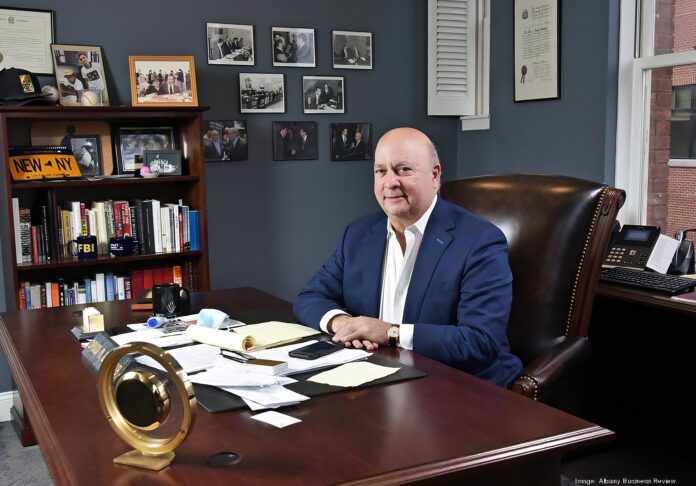According to the Oxford English Dictionary, the work of a lobbyist is “to seek to influence a politician or public official on an issue.” In other words, it’s the art of convincing. In New York, few do it better than David Weinraub and his lobbying firm, Brown & Weinraub. Of an estimated 12,000 registered lobbyists in Washington, David’s firm has been ranked first by several media outlets.
David’s client roster has included companies, labor unions, trade associations and other organizations that spend billions of dollars a year to lobby Congress and federal agencies. Lobbyists approach politicians on their clients’ behalf and try to get them to make decisions in line with their clients’ wishes. This may include passing (or not passing) legislation that can help or hinder the client’s cause. David’s work affects not only the government but the lives of every single American.
Speaking with David from his Albany office, we discussed several of his firm’s successes, including many that involved the Jewish community. He also shared some advice on how one can use the same tactics to help in a business deal. Enjoy!
—Nesanel
I was born in Brooklyn Jewish Hospital, which doesn’t even exist today, so I’m dating myself. I grew up in a couple of places in Brooklyn, including Crown Heights, until we moved to East Flatbush, where we stayed until I graduated high school.
“Both of my parents are from Brooklyn. My mother’s mother came from Romania, and she passed away when I was six. My mother’s father was born in New York. My father’s parents were also born in New York, but their ancestors were from Austria. My mother came from a big family—she was one of ten—so I was never alone. My aunts, uncles and cousins were always around.
“My family wasn’t religious. We kept the traditions, but not in a technical way. Interestingly, I went to the Crown Heights Yeshivah for the first grade, but I was only there that year. Then I went to three other local schools. I had a bar mitzvah in an Orthodox shul on Lenox Road. A rabbi come to the house and taught me everything I needed to know.
“I’m an only child. My father was a Local Union No. 3 IBEW electrician, and my mother was a housewife. My parents divorced when I was very young, but they both stayed in Brooklyn. I lived primarily with my mother, but I saw my father often. My childhood was spent balancing my time between the two of them. Looking back, that’s probably where I honed my negotiating skills.
“I wasn’t entrepreneurial as a teenager, but I always worked, both in the summer and during the year. I got my first job in the tenth grade working in a bedroom furniture warehouse after school. I schlepped bed frames and mattresses around, threw them onto a truck and unloaded furniture. One summer, I worked for my father’s friend who collected old clothes for charity. He needed someone to notify potential donors to leave their stuff outside so we could pick it up. I went around with flyers. One time I cheated and left out a whole block, and my boss noticed because no one left anything outside for pickup. I also worked in a catalog showroom.
“After I started college, my first real job was in the Fulton Fish Market. Whenever I needed money, I would go there and work for the wholesalers, picking up the fish from the truck and bringing it to their stands, where it was then bought by the retailers, hotels and restaurants. I would also put away whatever was left at the end of the day. My hours were usually from 2:00 a.m. to 10:00 a.m.
“I wanted to do something in criminal justice and went to St. John’s University in Queens, but in my sophomore year I decided that I wanted to be a lawyer. After graduating I worked for Jerry Brown, who was then the governor of California. When he ran for president in 1980 I joined his campaign, and that was my first real taste of politics.
“After the campaign, I entered law school. I started out at the University of San Diego because I had a relative in California and liked the idea of living there. But the next year I returned to Queens, as I couldn’t see my future on the West Coast.
“By the time I finished law school, I was 26 and married. At first I clerked for a small firm in Manhattan, helping out with litigation, research and writing. Then I went to two small boutique firms, but I wasn’t really happy. The hard work didn’t bother me, but I didn’t want to be doing it for someone else. So I quit abruptly and started practicing law with a few friends. We defended small-time criminals, represented clients in domestic disputes and worked with startup businesses. We were legal jacks-of-all trades.
“When I was 28, I was introduced to Governor Mario Cuomo by some acquaintances. Even before we met, I had always admired him. So I went to work for Governor Cuomo and found my passion. I loved the combination of law and politics.
“During his 1986 campaign, I did election law work on petitions and ballot access. I also made calls to Democrats urging them to come out and vote. That’s how I met Pat Riley, the Queens regional representative. She was leaving to work at the Department of Motor Vehicles and offered me her job. She explained that I would have to do a lot of constituency work, as well as briefing the governor and other officials. In a sense, I would be the eyes and ears of the governor in Queens. When I asked her if I could keep my law practice, she said no.
“Taking that job would mean a serious pay cut, but I realized that that was where I wanted to be. I told my wife, ‘I’m leaving the law firm where I’m making a really good salary to do what I really want to do.’ As soon as I started working there, she saw that I’d found something that truly made me happy, so she was supportive.
To read more, subscribe to Ami





















